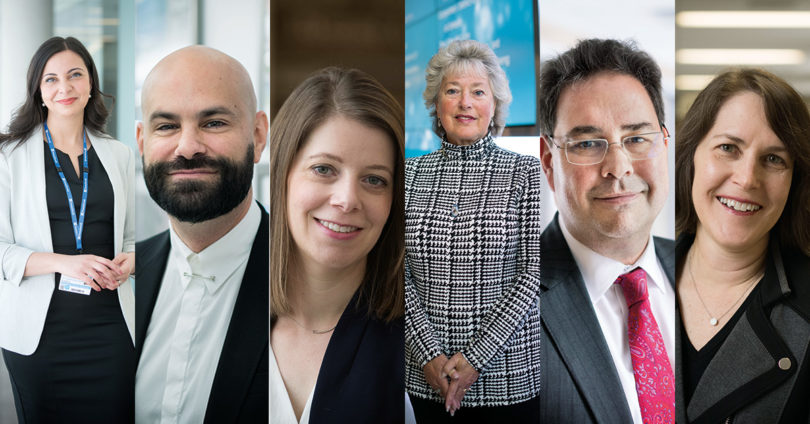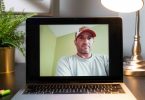Meet some of the inspiring faces that go above and beyond each and every day, in all corners of the hospital
Caring for the caregiver
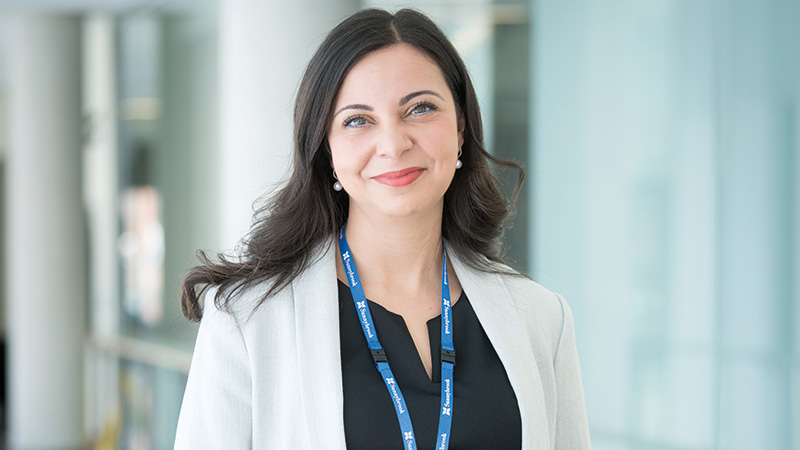
Dr. Marina Wasilewski
The rehab scientist
Caregiving can take a heavy toll on families, says Marina Wasilewski, a scientist at St. John’s Rehab. She has seen it in her work and within her own family, too.
When her grandmother’s health began to decline, Marina’s aunt took on the role of primary caregiver.
“She ended up having to provide complex care for my grandmother on top of managing her own health issues. She was doing so much and yet felt guilty for not doing more,” says Marina, who has explored the experiences of patients and families for the last six years.
Marina explains that caregivers tend to feel bad when they’re doing anything other than caring for their loved one.
“My aunt was one of the lucky ones – she had a large support network. There are many caregivers who take on the role – often unexpectedly – without any support at all,” she adds.
In an effort to expand social and peer support for patients and families, Marina is investigating how digital and internet technologies can facilitate peer-to-peer interaction.
With more than 3.3 million Ontarians providing care to a family member or other loved one, Marina believes there is more the health-care system can do to support the psychosocial health of caregivers.
“Tell them it’s okay to take a break,” says Marina. “You have to take care of yourself before you can take care of others.”
– Katherine Nazimek
The healing power of music
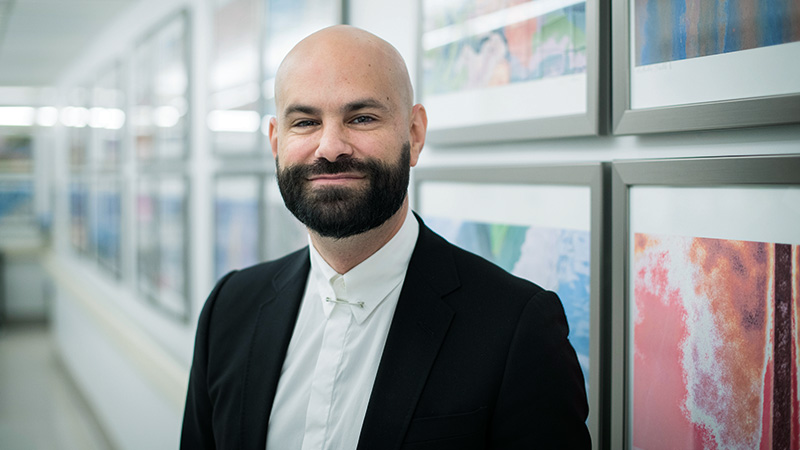
François Gallant
The radiation therapist
As a radiation therapist, François Gallant knows how hard cancer treatments can be on patients. That’s why he tries to bring as much humanity and positivity to the process as possible – even while patients are sitting in the waiting room.
An accomplished singer, François has spearheaded a new event called Music Health Cares at Sunnybrook’s Odette Cancer Centre, where staff members come to play music for patients.
Four times per year on the main floor of the atrium, François and other musical colleagues feature acoustic songs with uplifting themes and also invite other staff members to speak about their roles and include personal stories regarding their profession.
The feedback has been overwhelmingly positive.
“One person said that it was their first day of treatment, and our music changed their whole perspective,” he recalls.
“Hearing that made me very proud of what we’d created by sharing that part of ourselves.”
François’s efforts to go above and beyond aren’t limited to his musical talents. He also saw a need for more awareness of LGBTQ2S+ issues at Sunnybrook, which is why he created an awareness campaign and skills training for staff to help patients and staff who identify as LGBTQ2S+.
“It is important to have safe space signs, posters and pamphlets of inclusivity, so that people know they are welcome and safe,” he says.
Whether it’s harnessing the healing power of music or being more attuned to the specific health concerns of patients, François says health-care professionals are at their best when they are bringing a piece of who they are and what they love to their work every day.
“Music, building relationships, community and travel – these are all important parts of my life,” he says. “I provide better care by making them a part of what I do.”
– Laurie Legere
Drawn to excellence in research

Dr. Jenny Rabin
The neuropsychology lead
Dr. Jenny Rabin always knew she wanted to come home, but she was waiting for the right moment.
That moment came when she interviewed for a scientist position at Sunnybrook.
“I knew instantly this was the role for me,” says Dr. Rabin, who joined the hospital in 2019 as the neuropsychology lead at the Harquail Centre for Neuromodulation. “Not only is Sunnybrook’s work incredibly inspirational in terms of impacting treatment of brain disorders, but the team is [also] warm and welcoming.”
Dr. Rabin had been living in Boston while completing her postdoctoral fellowship and was eager to return to her hometown of Toronto, but only if she found the right fit for her career.
She met with the Sunnybrook team, including Drs. Sandra Black and Nir Lipsman, international leaders in developing strategies to treat the most debilitating brain conditions. Dr. Rabin says it quickly became clear that she had finally found the perfect home for her research career.
“The creative process among the researchers here at Sunnybrook is unprecedented; they are constantly asking new questions and using innovative methods,” she says. “It is powerful and important work.”
In her research, Dr. Rabin uses advanced imaging techniques to explore the role of modifiable lifestyle factors, such as physical activity and other daily habits, in delaying the progression of Alzheimer’s disease. She says Sunnybrook’s leadership in using focused ultrasound was a huge draw. The hospital is a world leader in testing this minimally invasive technology as a potential treatment for Alzheimer’s disease, amyotrophic lateral sclerosis (ALS), Parkinson’s disease, essential tremor, major depression, obsessive-compulsive disorder and other challenging brain disorders.
“Sunnybrook is the full package – excellence in brain sciences, coupled with a compassionate and caring clinical and research team,” Dr. Rabin says.
– Marie Sanderson
A garden with purpose
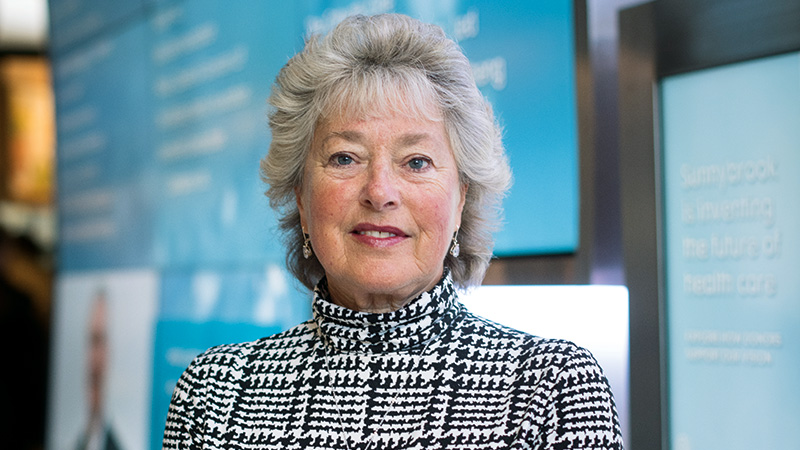
Heather Talbot
The patient partner
At Sunnybrook, patient partners are patients or family members who volunteer their time to get involved in projects and initiatives across the hospital.
For Heather Talbot, becoming a patient partner was the perfect way to give back to the hospital while also accomplishing a longtime goal: to create a memorial plaque and garden to honour the sacrifices of organ and tissue donors.
“It took a year of planning, but when my husband Terry and I were able to cut the ribbon at the opening of the garden last September, it really meant a lot to us,” Heather says.
Heather became involved in organ-donation advocacy a decade ago, after her son, Jonathon, was critically injured in a car crash at the age of 22. He was admitted to Sunnybrook’s critical care unit, where Heather and her husband discussed the possibility of organ and tissue donation with Jonathon’s care team after discovering their son was registered as a donor.
“My first instinct was to say, ‛No,’” Heather says. “My children and I are Jewish, and I wasn’t sure it would be possible to do this in a way that honoured our faith.”
After consulting with a rabbi and learning that organ donation is permitted because it would save another life, Heather felt confident that donating was the right decision. Ultimately, Jonathon’s heart valves were donated to a children’s hospital, while his kidneys, liver and lungs helped four other people live.
“If we hadn’t consented to donating, we would have missed this gift Jonathon gave us – a life enriched with purpose,” Heather says.
Part of that purpose is encouraging others to think about their own donor status, she adds.
“When people see the new memorial garden, I hope it inspires them to register as an organ donor,” says Heather. “It’s my way of honouring Jonathon’s memory.”
– Sybil Millar
Improving quality of life for people with dementia
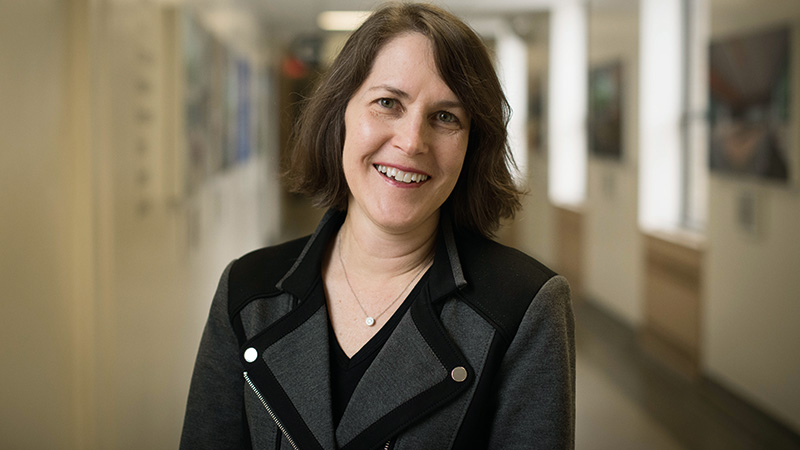
Dr. Krista Lanctôt
The senior scientist
When it comes to dementia, finding new ways of treating symptoms to improve quality of life is just as important as researching permanent solutions for the debilitating disease, says Dr. Krista Lanctôt.
“People with Alzheimer’s and other dementias may experience apathy, depression, aggression, agitation and other cognitive changes that can significantly affect their quality of life,” explains Dr. Lanctôt, senior scientist with Sunnybrook’s Hurvitz Brain Sciences Program. “Unfortunately, there are not a lot of good treatment options available at the moment.”
Dr. Lanctôt is hoping to change that. She and her team are exploring a creative array of treatment options, including a cannabis- derived compound that may be effective for patients experiencing behavioural symptoms like agitation.
“We’ve seen some promising preliminary results in clinical trials, and we’re excited to further explore how cannabis might be used therapeutically to help improve quality of life for people with dementia,” she says.
Dr. Lanctôt’s efforts to help people with dementia extend beyond Sunnybrook.
She plays the flute in a concert band, travelling to long-term care homes to share music with residents. She also volunteers along with her dog Tilley for Sunnybrook’s pet therapy program, which provides companionship and helps relieve stress and agitation among veterans with dementia in long-term care.
“It’s very rewarding to connect with patients on a human level, and for the sole purpose of improving quality of life,” she says. “Many people love dogs and pets. Having Tilley with me when I go to visit them immediately gives us something in common and opens the door for conversation.”
– Laurie Legere
Reconnecting with patients
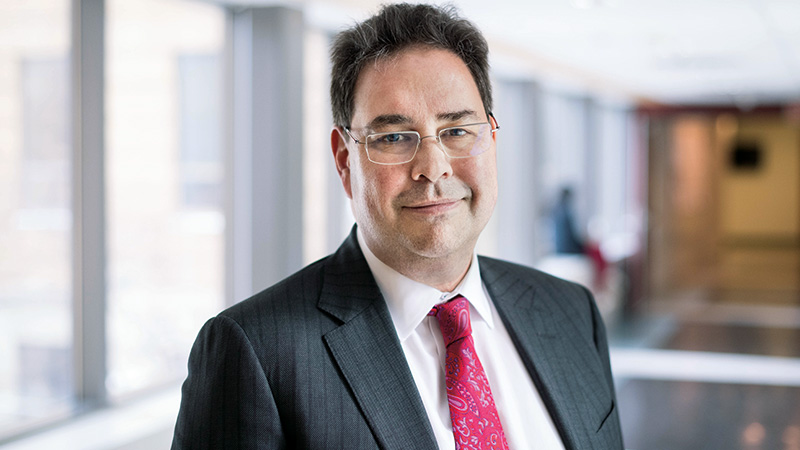
Dr. Dan Cass
The chief medical executive
Every Thursday evening, Dr. Dan Cass switches gears.
He leaves Sunnybrook’s Bayview Avenue campus and heads downtown to provide care at a drop-in clinic for homeless or marginally housed men and women.
“The care we provide at the drop-in is usually related to acute medical problems or mental health and addictions issues and helps avoid unnecessary emergency department visits,” says Dr. Cass, Sunnybrook’s executive vice-president and chief medical executive.
“Many of the clients are really trying to get their lives back on track, despite having medical and mental health issues that may put that at risk. It’s incredibly gratifying to provide access to care to help improve their health and quality of life.”
Dr. Cass says the time he spends at the clinic also informs his work at Sunnybrook, where he oversees the hospital’s physician team and supervises operations of five robust clinical programs, as well as being Sunnybrook’s executive lead for the North Toronto Ontario Health Team.
“I hope to instill that same sense of importance of respect and person-centred care in everything I do, whether it’s working with the physician team at the hospital or overseeing our clinical programs,” he says. “All people have the right to access quality health care and be treated with dignity.”
Working with marginalized individuals is a vocation close to Dr. Cass’s heart. Before joining Sunnybrook in 2018, he spent 16 years as an emergency physician at a downtown trauma hospital.
The few hours he spends at the drop-in clinic each week provide an opportunity for him to reconnect with patients.
“Homelessness is a social issue, but has deep implications for health care; providing flexible access to care is crucial,” says Dr. Cass. “I’m privileged to play a small role.”
– Marie Sanderson
Photography by Kevin Van Paassen


